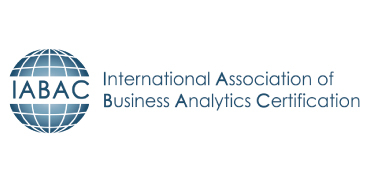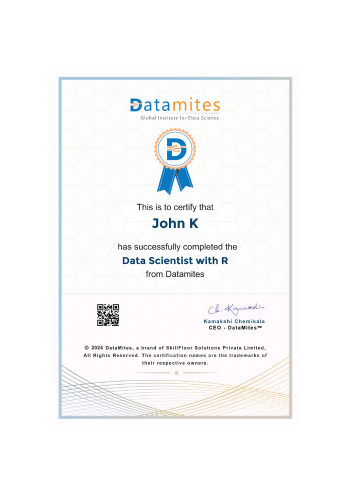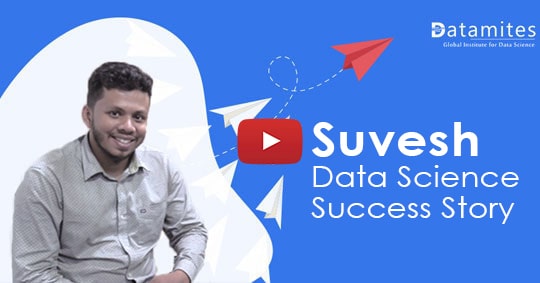Instructor Led Live Online
Self Learning + Live Mentoring
Customize Your Training
The entire training includes real-world projects and highly valuable case studies.
IABAC® certification provides global recognition of the relevant skills, thereby opening opportunities across the world.
The following topics are covered here
Module 1 - Introduction to Data Science with Python
Module 2 - Python Basics: Basic Syntax, Data Structures
Module 3 - Numppy Package
Module 4 - Pandas Package
Module 5 - Python Advanced: Data Mugging with Pandas
Module 6 - Python Advanced: Visualization with MatPlotLib
Module 7 - Exploratory Data Analysis: Case Study
The following topics are covered here
Module 1: Introduction to Statistics
Module 2: Harnessing Data
Module 3: Exploratory Analysis
Module 4: Distributions
Module 5: Hypothesis & computational Techniques
Module 6: Correlation & Regression
The following topics are covered here
Module 1: Machine Learning Introduction
Module 2: Machine Learning Algorithms
Module 3: Supervised Learning
Module 4: Unsupervised Learning
The following topics are covered here
Module 1: Advanced Machine Learning Concepts
Module 2: Principle Component Analysis (PCA)
Module 3: Random Forest - Ensemble
Module 4: Support Vector Machine (SVM)
Module 5: Natural Language Processing (NLP)
Module 6: Naïve Bayes Classifier
Module 7: Artificial Neural Network (ANN)
Module 8: Tensorflow overview and Deep Learning Intro
Module 1: Tableau Introduction
Module 2: Connecting to Data Source
Module 3: Visual Analytics
Module 4: Forecasting
Module 1: Understanding Business Case
Module 2: Writing Data Science Business Case
Module 3: Benefits Analysis
Module 4: Starting project, Setting up Team and closing
Introduction to Data Science
What is Data Science?
What is Machine Learning?
What is Deep Learning?
What is Artificial Intelligence?
Data Analytics and its types
Introduction to R
What is R?
Why R?
Installing R
R environment
How to get help in R
R Studio Review
R Packages
Data Types
Variable Vectors
Lists
Environment Setup
Array
Matrix
Data Frames
Factors
Loops
Functions
Packages
In-Built Datasets
R Basics
Importing data
Manipulating data
Statistics Basics
Error metrics
Machine Learning
Supervised Learning
Unsupervised Learning
Machine Learning using R
Introduction to Deep Learning
Overview of Machine Learning Concepts
TensorFlow Essentials
ML Algorithm - Linear Regression in TensorFlow
Deep Neural Networks in TensorFlow
Convolutional Neural Networks
Reinforcement Learning in Tensorflow
Hands on Deep Learning Application with TensorFlow
Introduction to TensorFlow
Basic Statistics
Machine Learning Introduction
TensorFlow Essentials
ML Algorithm - Linear Regression in TensorFlow
ML Algorithm - Classification in TensorFlow
ML Algorithm - Clustering in TensorFlow
Simple Neural Networks in TensorFlow
Reinforcement learning
Convolutional and Recurrent Neural Networks
Case study - Stock Market Analsis with TensorFlow
About Data Science with R Course
Basic concepts of R Programming
Stack, Merge and Strsplit
Functions of R Calculator
Assigning a value to variables and generating repeat and factor levels
Performing sorting and analyze variance
Creating charts, plots, and vectors
ODBC Tables reading
Database connectivity
R language is one of the top languages that most of the companies are demanding.
Learning Data Science with R opens new career opportunities for both beginners and professionals.
It helps you achieve top programming jobs with the help of lab sessions, assignments and project work.
Also, this training program helps you prepare for the R Certification exam.
After successful completion of the course “Data Science with R”, you should have,
Gained a better knowledge of the workflow of data science with R language
Understood the key concepts of data science
Gained hands-on knowledge of R language
In-depth knowledge of data manipulation, data visualization, advanced analytics and data mining.
High demand for data scientists as a very less number of eligible candidates are available to be hired
High salaries as per the demand for data scientists as supply is low
Software Engineers and Data Analysts
SAS developers who aspire to learn the open-source technology
Business Intelligence professionals
Candidates who want to start a career in Data Science
We have 6 solid reasons to say that our DataMites is one of the best institutes for data science in Bangalore and can strongly recommend you to join with us:
IABAC accredited
Elite Faculty & Mentors
Learning Approach
10+ industry projects
24*7 Cloud Lab for ONE year
Data Science involves the extraction of meaningful insights from large datasets, both structured and unstructured. It revolves around uncovering hidden patterns and transforming data into valuable information.
Data Science courses are open to individuals of all backgrounds, whether beginners or experienced professionals. Engineers, marketers, software developers, and IT workers can enroll in part-time or external programs. Traditional Data Science courses typically require a high school education as a prerequisite.
The fee for Data Science courses varies depending on the level of training desired. Generally, classroom training for Data Science ranges from 1000 USD to 3000 USD, regardless of the chosen training provider.
After completing Data Science Training, individuals have the opportunity to pursue diverse career paths, including positions such as Data Scientist, Machine Learning Engineer, Data Engineer, Machine Learning Scientist, Application Architect, Data Architect, Statistician, Data Analyst, Business Intelligence Analyst, and Marketing Analyst.
Learning Data Science requires technical skills such as data analysis, statistical knowledge, data storytelling, communication, and problem-solving.
The duration of Data Science training varies depending on the subject level and syllabus designed for different branches within Data Science. It can range from 2 months to 1 year, providing comprehensive knowledge and skills.
While having a strong understanding of programming languages like Python, R, Excel, C++, Java, and SQL is preferred in the field of Data Science, beginners can start with the basics and gradually improve their programming skills.
With a willingness to learn and guidance from experienced faculty, Data Science, like any other field, can be relatively easy to grasp and establish a career in. However, the vastness of the field can sometimes overwhelm beginners, making the learning process challenging and occasionally frustrating.
Data Science practitioners commonly rely on a range of tools, including SAS, Apache Hadoop, Tableau, BigML, Knime, RapidMiner, Excel, Apache Flink, and Power BI. These tools play a crucial role in tasks such as data analysis, visualization, and data processing.
R Programming is a programming language and software environment that specializes in statistical analysis, data visualization, and reporting. It provides a comprehensive set of tools and libraries for conducting statistical computations, creating data visualizations, and generating reports based on data analysis results.
R is a programming language that is specifically designed for statistical analysis and data visualization purposes. It is extensively utilized by professionals such as business analysts, data scientists, and scientists to perform data analysis, extract valuable insights, and visualize data in a meaningful way. With its rich set of statistical functions and powerful visualization capabilities, R provides a comprehensive environment for data exploration, modeling, and presentation.
Python and R have distinct differences in terms of their purpose and scope. Python is a versatile programming language that can be applied to various domains, while R is specifically designed for statistical analysis and computing. Python has a wider range of applications beyond data science, whereas R is primarily focused on statistical computing and data analysis.
Yes, learning R in 2023 is worthwhile. Many prominent tech companies, including Facebook, Google, and Uber, use R for their data analysis needs. With the increasing demand for data science and machine learning, acquiring R programming skills can be valuable for future career prospects.
Yes, freshers can pursue a career in Data Science. In India, many entry-level analytics positions do not require prior experience or post-graduation. These companies primarily seek candidates with a bachelor's degree in engineering, regardless of the stream, and focus on aptitude, communication skills, and critical thinking abilities.
Total course fee should be paid before 50% of the course completion. We also have EMI option tied up with bank. Check with coordinators.
Certified Data Scientist is delivered in both Classroom and Online mode. Classroom is provided in selected cities in India such as Bangalore, Hyderabad.
No, Most of software are free and open source. The guidelines to setup software is a part of course.
Yes. The IABAC Exam fee is included in the course fee. No extra fee is charged.
All the online sessions are recorded and shared so you can revise the missed session. For Classroom, speak to the coordinator to join the session in another batch.
We have a dedicated PAT (Placement Assistance team) to provide 100% support in finding your dream job.
Yes, you do get job support throughout the course training. We have a special team dedicated to placement assistance, called Placement Assistance Team (PAT). We help you build your proper resume, share and skill you with top interview questions and answers in the particular technology. Also, we discuss real-world projects using specific technology that you are into.
The different payment modes that are accepted by us:
1. Online payments
2. Debit Card
3. Credit Card
As per the latest reports from Glassdoor, the average salary of a Data Science with R professional earns Rs.62,02,144/- in Bangalore. Anyhow, the salary of an individual varies based on city, industry and total years of experience.
Data Science is ruling many domains around the world. Companies are paying high wages for data science professionals. Organizations are looking out for different types of job roles in data science like:
Data Scientist
Data Analyst
Business Analytics Expert
Support Engineer
Statistical Programmer Specialist
Research Analyst
Business Analyst Consultant/ Manager
As per taking up the course, there are no such pre-requisites, but possessing certain kind of skills set would be highly beneficial:
Good critical thinking and problem-solving skills
Mathematical and Analytical skills
Technical knowledge regarding Python, R and SAS tools
Communication skills
You can attend the classes for the batch that you have registered for. And in any case, if you miss any session, you can attend the particular session with any other batch according to flexible timings.
We have a 24*7 customer support team that can help you assist with all kinds of information and queries regarding the courses. You can come forward and put your doubts to them.
Yes, you will be provided with a Data Science with R certificate from DataMites once you complete the training.
The DataMites Data Science with R training encompasses various topics such as the basic concepts of R Programming, stack, merge and strsplit operations, functions of the R calculator, variable assignment and factor levels generation, sorting and variance analysis, chart creation and vector manipulation, ODBC table reading, and database connectivity.
The DataMites Certified Data Scientist - R Course is suitable for young graduates, freshers, software engineers, data analysts, business intelligence professionals, and SAS developers who are interested in entering the field of Data Science and wish to learn the open-source technology.
If you are interested in the Data Science industry and aspire to work in this field, you are eligible to apply for the DataMites Data Science with R program.
The DataMites Data Science with R training is designed to provide comprehensive knowledge of R's significance in Data Science and its applications. Through hands-on lab sessions, assignments, and project work, this training program helps you acquire the necessary skills for top programming jobs. It also prepares you for the R Certification exam.
DataMites is a globally accredited institute for Data Science, recognized by the International Association of Business Analytics Certifications (IABAC). With over 25,000 enrolled students, DataMites offers a three-phase learning approach consisting of self-study materials, intensive live online instruction, and real-world projects. After completing the training, you will receive the globally recognized IABAC Data Science with R Certification. Additionally, DataMites provides internship opportunities with Rubixe, a global technology company.
The DataMites data science with R course fee is as follows:
The DataMites Data Science with R program has a duration of 6 months.
DataMites offers classroom training, but currently only in Bangalore. However, upon demand and availability of candidates from other locations, DataMites can organize classroom training sessions.
DataMites ensures that certified and highly experienced instructors, with extensive industry expertise and subject matter knowledge, are selected to train the students.
The FLEXI-PASS allows participants to attend DataMites sessions for a period of 3 months, enabling them to seek clarification or revision on any topics.
Upon completion of the course, DataMites provides the IABAC® certification, which is globally recognized and validates the skills you have acquired.
Yes, upon successfully completing the course, DataMites will award you with a Course Completion Certificate.
If you miss a class, you can contact your trainers to schedule a makeup class that fits within your schedule. Additionally, every session of the Data Science with R training will be recorded and made available for you to catch up at your own pace.
Yes, DataMites has a specialized Placement Assistance Team (PAT) that supports participants with job placement opportunities upon completing the course.
DataMites follows a case study approach to learning, where participants progress through theory, hands-on exercises, case studies, projects, and model deployment.
Yes, you can request support sessions if you require further clarification on any topic. DataMites encourages participants to make the most out of their training sessions.
DataMites accepts payment through cash, net banking, cheque, debit card, credit card, PayPal, Visa, Mastercard, and American Express.
The DataMites Placement Assistance Team(PAT) facilitates the aspirants in taking all the necessary steps in starting their career in Data Science. Some of the services provided by PAT are: -
The DataMites Placement Assistance Team(PAT) conducts sessions on career mentoring for the aspirants with a view of helping them realize the purpose they have to serve when they step into the corporate world. The students are guided by industry experts about the various possibilities in the Data Science career, this will help the aspirants to draw a clear picture of the career options available. Also, they will be made knowledgeable about the various obstacles they are likely to face as a fresher in the field, and how they can tackle.
No, PAT does not promise a job, but it helps the aspirants to build the required potential needed in landing a career. The aspirants can capitalize on the acquired skills, in the long run, to a successful career in Data Science.













